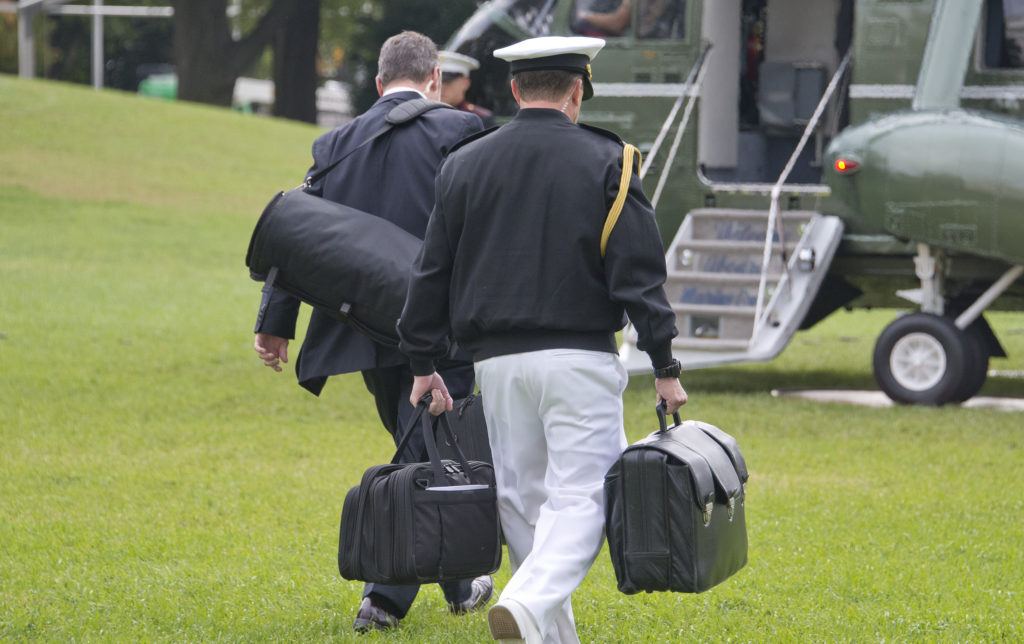H R McMaster, Jim Mattis and John Kelly alongside Donald Trump in October 2017. Photo by Andrew Harrer via PA Images.

How many Americans, waking in a cold sweat in the dead of night, worried that their president is about to attack North Korea or Mexico or Stormy Daniels – or all of them simultaneously – have been able to calm themselves and return to sleep with the gentle words of their spouse whispering in their ear: “Don’t fret honey: General Mattis is there. General McMaster is there. General Kelly…”
Well, it’s time to sit bolt upright and sleep no more. Retired General Kelly might not be long for his post of White House Chief of Staff. Retired Marine General James Mattis might also be looking for a way out of the top job at the Pentagon. And rumours abound about the fractured relationship between Trump and Lt Gen H R McMaster (who is still in uniform) and whose job as National Security Adviser could not be more pivotal in these dangerous times. Asked about his future in the last few days the General would only say: “Everybody has got to leave the White House at some point.”
Trump, we are told, is wanting to seize the control that he thinks he has lost. Mike Pompeo’s installation at the State Department is part of it, but there is more to come. Although rumours of a weekend mass sacking came to nothing, the military men (and a few others) seem to be working out their notice.
It would be a big change…
…but it might also be a good thing.
One of the great ironies of the Trump presidency has been the welcoming of former apolitical soldiers into the very heart of his ‘drain the swamp’ White House of outsiders. The Trump presidency has been bolstered in key areas and in moments of crisis by agents of what one might term non-partisan continuity.
And, to continue the irony, many liberal anti-Trumpers are, of course, just delighted that weighty generals and ex-Generals are there. They would view with much apprehension the idea that Trump might be freed from the dead-eyed oversight of the wearers of brass. The Generals are saving the Republic from the president – and possibly the world, too. They must stay at all costs – running things from behind the scenes with their fingers covering every possible trigger. Their fingers – not his.

Eliot Cohen, the director of the Strategic Studies Program at Johns Hopkins University, former State Department advisor and member of UnHerd’s History Jury – has coined a term that seeks to humanise this takeover. He calls the rule of the Generals “a benign Junta”. Evan McMullin, the former CIA man who ran for the presidency as an independent in an effort to derail Trump, told me that the part of the appeal of these men is their dislike of politics and politicians.
When John Brennan, the former CIA boss, Tweets that Trump will one day be regarded as “a disgraced demagogue in the dustbin of history”, he is regarded by many as properly nonpartisan. Telling it like it is. Saying what must be said.
The suggestion is that this is a temporary disaster-aversion programme. The Generals and retired men of action are doing what good soldiers always do: putting their lives on the line for their country. Eventually there will be medals and a ticker-tape parade and a grateful world will move on into a post-Trump future.
 But there is an alternative way of looking at this ‘junta’. That would suggest the departure of Kelly et al – while unsettling in the short term – should be welcomed for the longer-term. It’s a view hinted at by the former Bush speechwriter and Republican intellectual David Frum in Trumpocracy (his broadside blasting of the Trump White House and the Trump modus operandi). Frum has no trouble with the Generals in this White House. He follows entirely the anti-Trumpers’ view that Kelly et al are public servants doing a horrid job. Frum points out that some American liberals are also receiving an education in who the friends of the Republic really are. How very suddenly the FBI has replaced Edward Snowden as a pin-up in the salons of San Francisco.
But there is an alternative way of looking at this ‘junta’. That would suggest the departure of Kelly et al – while unsettling in the short term – should be welcomed for the longer-term. It’s a view hinted at by the former Bush speechwriter and Republican intellectual David Frum in Trumpocracy (his broadside blasting of the Trump White House and the Trump modus operandi). Frum has no trouble with the Generals in this White House. He follows entirely the anti-Trumpers’ view that Kelly et al are public servants doing a horrid job. Frum points out that some American liberals are also receiving an education in who the friends of the Republic really are. How very suddenly the FBI has replaced Edward Snowden as a pin-up in the salons of San Francisco.
But Frum worries about the future. What if the Democratic Party decides to go down the Trump road and selects a candidate in 2020 that the military folk think is unserious, or unstable, or downright dangerous? What if they don’t like the look of Oprah? What if they think she’s weak or unstable or ignorant? In the longer-term, does the ‘saving of the Republic’ in a time of Trump open the door for future involvement and intervention that subverts democracy long after Trump is gone?
One of the problems here is that lunatic conspiracy theorists have made discussion of these matters decidedly tricky. There is a whole world of online madness among those who think Trump is being done in by the deep state. My personal favourite is a suggestion that NASA and the mainstream media, in cahoots with the intelligence agencies, are about to stage a fake alien invasion in order to get a tighter grip on power. David Frum has dismissed these characters with customary elan: “Once you realize that ‘deep state’ is code for ‘the rule of law’, you can translate their jibberish into something more like English.”
But as Frum himself points out, there have been times in recent American history when the intelligence agencies, the military, the powers-that-be in the shady parts of the American authority superstructure, have been too much in charge. They were reined in during the 1970s but as Frum remarks in his book, “Trump has given them powerful and righteous motives to emancipate themselves.”
And go back to how they were. Routinely spying on and second guessing the democratically elected leaders of the nation. Folks such as J Edgar Hoover at the FBI, who famously kept tabs on a wide range of Americans he didn’t approve of, including his boss the Attorney General. The Joint Chiefs of Staff who kept an eye on Nixon in the “The Moorer-Radford affair“, named after the chairman of the Joint Chiefs at the time, Admiral Thomas H. Moorer, and the stenographer, Navy Yeoman Charles Radford, who stole documents on behalf of his military boss.
Stories of penetration and subterfuge involving multiple government agencies pepper the histories of 1960s Washington DC. When the film “Seven Days in May” – starring Kurt Douglas and Ava Gardner – hit cinemas in 1964, the tale of an arms treaty with the Soviet Union being subverted by the military did not seem to many Americans to be that far-fetched. There was a deep state.
So, yes, there will be handwringing if and when Kelly and Mattis and McMaster bite the dust in the coming days but there will be some relief too. As the conservative Washington Post columnist Jennifer Rubin put it in an article last year when General Kelly attacked a member of Congress and refused to be questioned about it, “Congress needs to stomp out creeping military authoritarianism. Congress should start by barring generals from acting in civilian capacities in the White House.”
Congress will do no such thing any time soon. But when the predictable howls of outrage follow the departure of the military ‘adults in the room’, it’s worth remembering that the room – the Oval office – is meant to be in civilian democratic control.
That civilian is Donald J Trump – and whoever is chosen in the future to replace him. Sometimes that might feel ghastly but, as plenty of thinking Americans will tell you, the alternative is worse.










Join the discussion
Join like minded readers that support our journalism by becoming a paid subscriber
To join the discussion in the comments, become a paid subscriber.
Join like minded readers that support our journalism, read unlimited articles and enjoy other subscriber-only benefits.
Subscribe